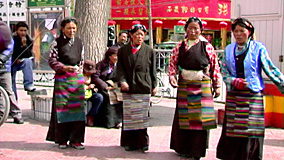It can be hard for the Tibetan people to keep the international community interested in their cause. A week ago we have read in the news that Tibetans set themselves on fire to protest China’s repression of Tibet (New York Times). China occupied Tibet in the 1950’s and considers itself a liberator of Tibet. The documentary Tibet in Song (2009) gives a historical overview and shows how the Chinese regime tries to erase the Tibetan cultural identity.
by Magda Pucci and Charlie Crooijmans
The director of Tibet in Song, Ngawang Choephel, was born in Tibet and raised in Mundgod, India. As a musician and ethnomusicologist he wanted to document the folk songs of his motherland. In 1995 he decided to go back and get to know the country. Arriving at Lhasa the only thing he heard was Chinese pop music. It could be heard in bars, shops, karaoke, practically everywhere.
Choephel had to travel to the mountains where Tibetan culture is still preserved. During his journey he collected lots of songs. He sent a box of material to his home in India. But while on his way to visit his father, who still lived in Tibet, the rest of his material was confiscated and destroyed by the Chinese police. They arrested him and he was sentenced in a secret trial to 18 years in prison for “espionage and counter-revolutionary activities”. His mother in India started a campaign. She received support from Amnesty International and musicians like Paul McCartney and Annie Lennox. After 6 years Choephel was set free and he could continue working on his film.
The film informs us about the Chinese reinvention of Tibetan culture. Famous Tibetan singers, for example, are singing about the glory of communism. At festivals organised by the Chinese the traditional costumes are incorrect and the dances are wrongly carried out. The audience in remote villages doesn’t know how to react but as the Chinese Government prohibits their own music to be performed – no Tibetan song is permitted – the people slowly will appreciate these superficial ‘Tibetan’ performances. In addition, people are continuously confronted with Chinese music. Choephel interviewed three young women that were tortured because they didn’t want to sing the Communist Chinese Hymn when they were imprisoned. The self-immolating monks were not included in the film.

Reblogged this on Magda Pucci .
Director Choephel deserves my great respects. What was wrong with collecting songs. It costed him 18 years in prison. Unbelievable. But, among others he got support from Paul McCartney and Amnesty International, so he was released after 6 years in prison. 6 Years from his life. And, with what purpose? My grandson watched the clip and he did like it very much. Beautiful he said. You see all things are in the right place!